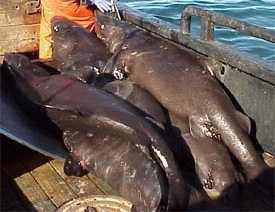 Many non-meat eaters, myself included, think of fish as a more ethical choice over factory-farmed meat. There are reasons to reconsider this.
Many non-meat eaters, myself included, think of fish as a more ethical choice over factory-farmed meat. There are reasons to reconsider this.
An editorial from The Economist (“Net Positive” July 16-22) draws attention to the increasingly problematic practice of deep sea fishing.
Under international law the high seas, which span 64% of the surface of the ocean, are defined as “the common heritage of mankind.” This definition might have provided enough protection if the high seas were still beyond mankind’s reach. But the arrival of better trawlers and whizzier mapping capabilities over the past six decades has ushered in a fishing free-for-all. Hauls from the high seas are worth $16 billion annually. Deprived of a chance to replenish themselves, stocks everywhere pay the price: almost 90% are fished either to sustainable limits or beyond. And high-seas fishing greatly disturbs the sea bed: the nets of bottom trawlers can shift boulders sighing as much as 25 tons.
Although there are many reasons for the over-fishing of the deep-seas, an especially problematic one is the nature of fishing subsidies which total “$30 billion a year, 70% of which are doled out by richer countries.” As a result, the vast majority of what is caught in the deep-seas goes to the ten richest countries, while Africa gets left-out, though it has more fishers than Europe and America combined.
The Marine Conservation Institute agrees that one of the best ways to protect the deep seas would be to “redirect subsidies to help displaced fishermen and rebuild fish populations in productive waters closer to ports and markets, places far more conducive to sustainable fisheries.”
A fundamental principle of Catholic Social Teaching is the universal destination of goods, which recognizes that God created the earth and her goods for all of humanity to benefit from, and that no individual or group ought to benefit from the earth at the expense of others. A perfect place to put this principle to work is the deep sea, an area of the world owned by no nation. However, the deepest and wildest parts of ocean have been plundered, with little global consensus in how to protect them. Rather than a paradigm of the universal destination of goods, the deep seas have become a textbook case of the “tragedy of the commons.”
For those concerned with global efforts to protect the high seas, this website provides up to date information about the UN’s work, which has a preparatory meeting at the end of August.
In the meantime, Catholics can be witnesses to the importance of the issue in other ways too. Catholics used to be known, in not necessarily friendly terms, as “fish eaters,” a reference to the fact that they ate fish, rather than meat on Fridays. Even now, when “fish Fridays” are reserved for Lent, Catholics still build community over a good fish dinner. It is important that the global community be kept in mind when Catholics plan their fish dinners and be sure to rely only on sustainable seafood choices.



Here are two ways Catholicism might be able to assist this issue within the realm of theology.
1) First, Catholicism has long seen human beings to be the central focus of God’s creation, which tends to relegate everything else to being of far lesser importance. Such a perspective is in conflict with the way God’s creation actually works, with everything being connected to everything else to a profound degree. Even the concept of “things being connected” tends to imply divisions within God’s creation which perhaps are only conceptual in nature. We are less likely to rape the environment if we see ourselves as being one with the environment, instead of above the environment.
We can still pursue our own spiritual development with enthusiasm without assuming that God’s creation is all about us. If that were true, life on Earth would not have existed a billion years before us, and most likely a billion years after us as well. The Catholic concept of humility would seem to come in very handy here.
2) The Church as a whole needs to finish the job of forgetting about prohibitions on contraception. Countries like the Philippines are headed for disaster because their populations are exploding, causing them to over fish local waters to unrecoverable levels. When their society thus collapses in to starvation and social chaos, contraception doctrines will be part of the reason.
To my knowledge the Bible and Jesus specifically never even mentioned contraception, revealing such outdated doctrines to be the work of imperfect (and celibate) men, not God.
It’s simply not credible to both embrace Catholic doctrines on contraception and bemoan over fishing of the oceans at the same time. Honest theologians face the job of deciding whether it is ideology and tradition, or human beings and their environment, which are their priority.